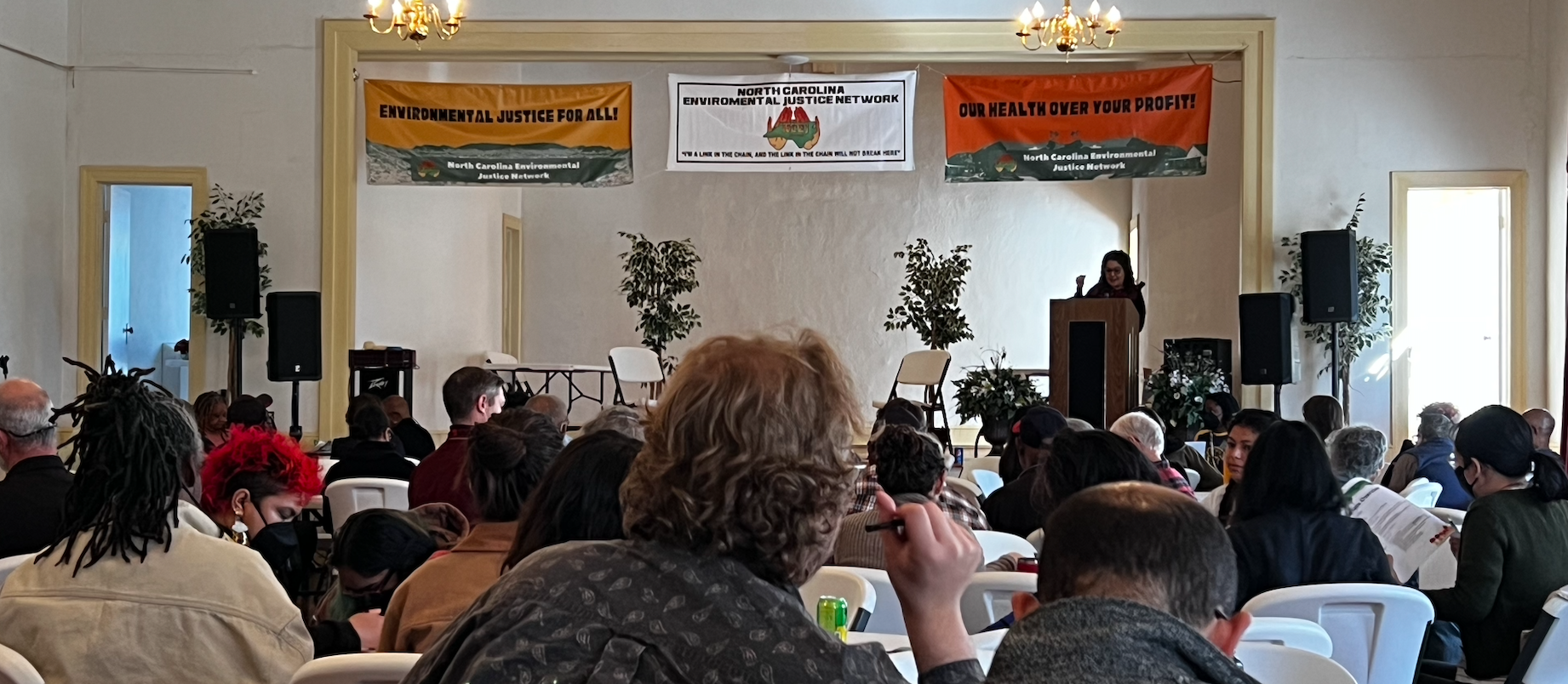The 2023 North Carolina Environmental Justice Summit, held from October 20 to 21, was a powerful gathering of activists, scholars, and community leaders dedicated to addressing environmental injustices. This two-day event, organized by the North Carolina Environmental Justice Network (NC EJN), was a resounding call to expose false solutions and work collaboratively toward genuine repair.
The summit opened with an inspirational welcome from Rania Masri, Chris Hawn, and Elly Mendez Angulo Brown from the NC EJ Network. Naeema Muhammad, the creator and advisor of NC EJN, facilitated a thought-provoking session that encouraged participants to identify the false solutions in the Environmental Justice (EJ) movement, to understand the extent of environmental issues in their own backyards, and to recognize the often-overlooked allies in this fight for justice.
Naeema Muhammad articulated a powerful perspective, stating that “a false solution is that DEQ does not have the authority to protect communities.” She emphasized that everyone attending the summit was there due to the existence of these false solutions and that the primary focus should be on honest repair. The session tackled essential questions, such as why distressed communities are often made to bear the brunt of industrial pollution and why industries are not held responsible for the costs rather than passing them on to vulnerable communities.
Larry Baldwin, former Coastal Carolina Riverwatch Waterkeeper and Waterkeeper Alliance CAFO Director, added his perspective, highlighting that “a false solution is our General Assembly” and underlining the need for younger activists to step into leadership roles and even run for political office. The session proved to be an eye-opening experience, as it identified false solutions while celebrating the wins achieved by the EJ movement, instilling a renewed commitment to effecting change for all communities facing environmental injustices.
Throughout the afternoon, panel presentations showcased Environmental Justice victories. Donna Chavis discussed the win against the Atlantic Coast Pipeline. Mac Legerton celebrated successes in battling toxic waste and landfills in Southeast North Carolina through the Robeson County Cooperative for Sustainable Development. Peter Gilbert emphasized the effectiveness of legal tools when working alongside communities, and Vivian Kennion shared the triumphant story of defeating Compute North. Ajamu Amiri Dillahunt moderated the presentations, reinforcing that organized efforts can yield victories.
On the evening of the same day, EJ research presentations delved into the scientific aspects of environmental justice. Akirah Epps evaluated satellite ammonia observations for understanding air pollution inequalities related to Concentrated Animal Feeding Operations (CAFOs). Liz Shapiro-Garza focused on increasing access to information and policy-making for communities impacted by chemical contaminants in wild-caught fish. Andrew George addressed drinking water contamination and health injustices facing private well users in North Carolina, a point also made by Jeff Currie, the Lumber Riverkeeper, about financial disparities and how “being poor takes a lot of money.” Joe Bowman highlighted the benefits of incorporating environmental justice community-engaged research in county-required Community Health Assessments.
The first day concluded with an awards ceremony and a fireside chat, where participants reflected on the day’s events and recognized the achievements of those committed to environmental justice.
On the second day of the summit, they commenced with a deep dive into the challenges of doing grassroots work within an oppressive state and capitalist system. Adrienne Kennedy and Shalonda Regan, representing the Seeds of H.O.P.E. Project and Disaster Recovery Relief Center, shared their experiences. Shalonda Regan’s words, “You have to put yourself in a wave of humanity. If they divide us, they will conquer,” echoed the spirit of unity and resilience that permeated the summit.
Workshops throughout the day covered critical topics, including the threat of manure biogas and other dangers associated with the growth of industrial agriculture and Concentrated Animal Feeding Operations (CAFOs). Donna Chavis, Mac Legerton, Jeff Currie, and Sherri White-Williamson shared their expertise, emphasizing the urgency of addressing these issues.
Another workshop explored the consequences of Duke Energy’s Climate and Community-Wrecking Grid Scheme, led by NC Warn’s Falicia Wang and Sara Heilman, who discussed environmental and community impacts.
The summit also featured other meetings that touched on topics such as toxic waste sites, pollution, and justice and discussions surrounding democracy, redistricting, and representation. These sessions, led by dedicated individuals and organizations, provided valuable insights into the multifaceted aspects of the environmental justice movement.
The 2023 North Carolina Environmental Justice Summit left a lasting impact on attendees, including CCRW Executive Director Lisa Rider and Board Director President Katie Tomberlin, illuminating the path forward for those committed to eradicating environmental injustices.
The event served as a testament to the power of collective action, truth-telling, and honest repair in the ongoing struggle for environmental justice. The summit demonstrated that change is possible when communities, activists, scholars, lawyers, and allies come together to address these critical issues.
SOURCE:
‘NC Environmental Justice Summit 2023: False Solutions, Honest Repair’ (October 20-21, 2023) Franklin Center, Whitakers, NC.

